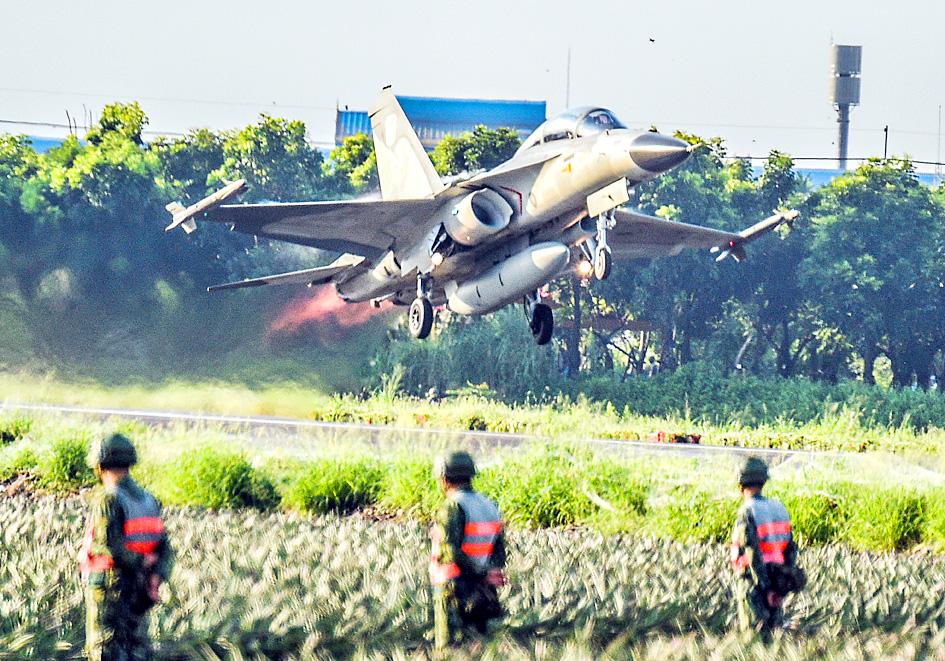The government should build more contingency runways to be used in the event of a Chinese attack on air force bases, Democratic Progressive Party Legislator Tsai Shih-ying (蔡適應) said on Saturday.
The annual Han Kuang military exercises, which ended on Friday, included an aircraft takeoff and landing exercise on a public road to test the military’s ability to adapt if air force runways are destroyed.
However, the exercises highlighted the lack of such contingency runways on the east coast of Taiwan proper, he said.

Photo: Chang Chung-yi, Taipei Times
“On the west coast there are lots of highways that are suitable for the purpose, but on the east coast there are only the bases and public airports in Hualien and Taitung counties,” he said.
With Chinese military aggression toward Taiwan on the rise over the past few years, members of the military and the public have been discussing the possibility of building more contingency runways on the east coast, he said.
Contingency runways on the west coast are all within reach of Chinese missiles, a miltiary official said yesterday, speaking on condition of anonymity.
Therefore, additional runways along the east coast in locations that are obstructed by mountains could prove invaluable in the event of an attack, they said.
The government could consider building a runway in a place like Taitung County’s Luye Township (鹿野), where there is a straight section of land for about 14.5km, they said, adding that military aircraft need only about 2km of runway to take off, so it would be more than enough space.
Chang Yan-ting (張延廷), a retired air marshal and adjunct professor at National Defense University, echoed concerns about the lack of contingency runways on the east coast, saying the area is strategically important and should be better protected.
Su Tzu-yun (蘇紫雲), a researcher at the Institute for National Defense and Security Research, said that more runways on the east coast would help mitigate some of the risk of a missile attack from China, and help bolster the nation’s defenses.

NATIONAL SECURITY THREAT: An official said that Guan Guan’s comments had gone beyond the threshold of free speech, as she advocated for the destruction of the ROC China-born media influencer Guan Guan’s (關關) residency permit has been revoked for repeatedly posting pro-China content that threatens national security, the National Immigration Agency said yesterday. Guan Guan has said many controversial things in her videos posted to Douyin (抖音), including “the red flag will soon be painted all over Taiwan” and “Taiwan is an inseparable part of China,” while expressing hope for expedited “reunification.” The agency received multiple reports alleging that Guan Guan had advocated for armed reunification last year. After investigating, the agency last month issued a notice requiring her to appear and account for her actions. Guan Guan appeared as required,

A strong cold air mass is expected to arrive tonight, bringing a change in weather and a drop in temperature, the Central Weather Administration (CWA) said. The coldest time would be early on Thursday morning, with temperatures in some areas dipping as low as 8°C, it said. Daytime highs yesterday were 22°C to 24°C in northern and eastern Taiwan, and about 25°C to 28°C in the central and southern regions, it said. However, nighttime lows would dip to about 15°C to 16°C in central and northern Taiwan as well as the northeast, and 17°C to 19°C elsewhere, it said. Tropical Storm Nokaen, currently

‘NATO-PLUS’: ‘Our strategic partners in the Indo-Pacific are facing increasing aggression by the Chinese Communist Party,’ US Representative Rob Wittman said The US House of Representatives on Monday released its version of the Consolidated Appropriations Act, which includes US$1.15 billion to support security cooperation with Taiwan. The omnibus act, covering US$1.2 trillion of spending, allocates US$1 billion for the Taiwan Security Cooperation Initiative, as well as US$150 million for the replacement of defense articles and reimbursement of defense services provided to Taiwan. The fund allocations were based on the US National Defense Authorization Act for fiscal 2026 that was passed by the US Congress last month and authorized up to US$1 billion to the US Defense Security Cooperation Agency in support of the

PAPERS, PLEASE: The gang exploited the high value of the passports, selling them at inflated prices to Chinese buyers, who would treat them as ‘invisibility cloaks’ The Yilan District Court has handed four members of a syndicate prison terms ranging from one year and two months to two years and two months for their involvement in a scheme to purchase Taiwanese passports and resell them abroad at a massive markup. A Chinese human smuggling syndicate purchased Taiwanese passports through local criminal networks, exploiting the passports’ visa-free travel privileges to turn a profit of more than 20 times the original price, the court said. Such criminal organizations enable people to impersonate Taiwanese when entering and exiting Taiwan and other countries, undermining social order and the credibility of the nation’s